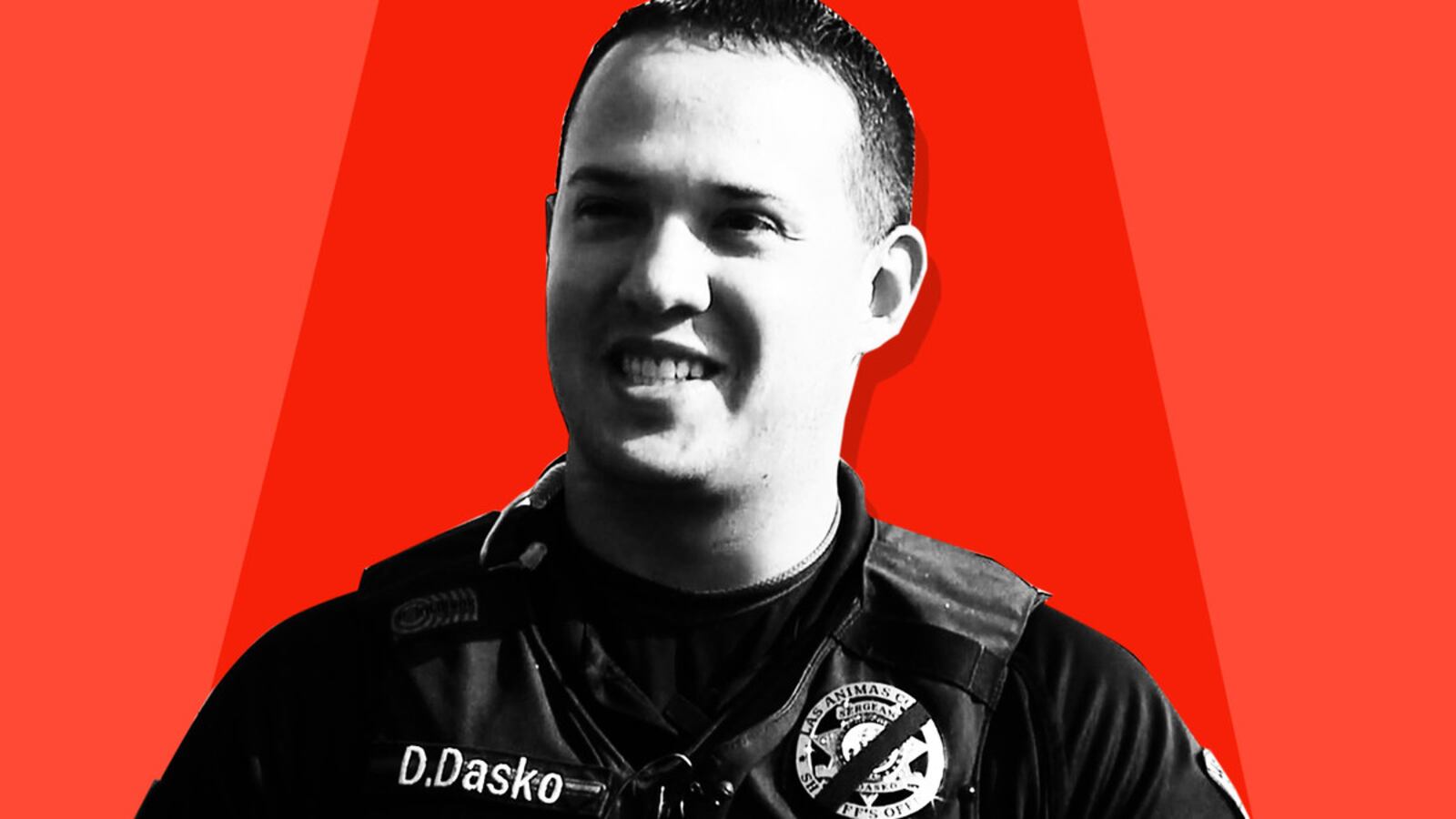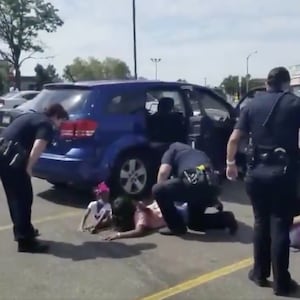Last August, a video of four terrified young Black girls face-down on hot asphalt and surrounded by police officers with guns drawn stoked fury around the country—a scene initiated by an Aurora, Colorado, cop who wrongly believed the family was in a stolen car.
Brittany Gilliam, 30, told The Daily Beast that she pleaded with Officer Darian Dasko to let her prove she owned the car after she was removed from it with her 6-year-old daughter, her 17-year-old sister, and two nieces aged 12 and 14. But as the girls cried on the ground, Dasko ignored her, she said.
She said she’s never forgotten his aggressive tactics or his cold-hearted response. So she was disheartened to learn that Dasko, 30, has submitted paperwork to run for sheriff of Las Animas County, a rural region of 15,000 three hours south of Aurora.
“I don’t know personally what type of person he is, but I don’t think he’s qualified,” Gilliam said. “I just know that he traumatized me and four kids. I can only go based off of that.”
Dasko did not respond to a request for comment.
Dasko joined the Aurora Police Department in 2018, after working as a deputy for the Las Animas County Sheriff’s Office for five years. After last summer’s incident, he received a weeklong suspension and was demoted from his position as a field training officer, according to a spokeswoman for the Aurora Police Department.
In January, the Arapahoe County District Attorney’s Office declined to bring criminal charges against him, writing that although no one in the car had committed any crimes or done anything to justify being removed from the car at gunpoint, there wasn’t enough evidence to prove Dasko “unlawfully, intentionally, knowingly, or negligently” violated any laws, according to a report obtained by The Daily Beast.
Gilliam said she and her family had driven to the strip mall that morning to go to a nail salon and get ice cream afterward, but the salon was closed. As Gilliam used her phone to find another salon, one of her nieces told her cops were behind them with guns drawn.
Over the next 10 minutes, Gilliam said, she was handcuffed and watched as the girls were laid out on the ground—two of the young girls were also handcuffed, according to the DA’s report—despite her insistent pleas that the police officers were wrong.
“At that point I didn’t know what to do. I was thinking to myself what happened? Why did it come to this?” she said.
Eventually, Dasko realized the hit he had got on a license plate reader was for a different state and that they’d made a mistake, according to police records. By then a crowd of angry onlookers disgusted by the sight of innocent children crying on the ground had formed and the entire incident spiraled, with at least 15 officers converging before the scene was cleared.
Gilliam, who has a pending lawsuit against Dasko and other officers, said her young family members still haven’t recovered from the experience and she’s seen their sleeping and eating habits change dramatically. “I’ve seen a shift and change in all of them that lets me know that they are traumatized and they have a lot to deal with,” she said.
Her daughter, who was wearing a pink tiara for the trip to the salon, is now afraid when they go out for fun outings, Gilliam said. “She thinks that we’re gonna get pulled over.”
Gilliam’s sentiments about Dasko and other Aurora officers were shared by Jenni Wurtz, who was parked next to Gilliam during the August incident and whose video footage of it led to national coverage.
Wurtz told The Daily Beast that when someone sent her a news item on Thursday about Dasko’s decision to run for office she had a hard time working for the rest of the day.
“My mind was blown,” she said. “You’re putting yourself in a position of leadership when clearly your leadership skills are questionable.”
While she doesn’t believe Dasko is the only officer to blame for what happened to Gilliam and the way her family was treated, she said she remembers how cold he seemed while she also pleaded with him to get the kids off the ground.
“That’s the part that stays with me,” she said. “I did not see humanity in that at all.”
She said his decision to seek the sheriff’s job less than a year after the furor did not suggest repentance.
“It’s not humble, it’s not ownership, it’s not how I would teach my kids to behave either. I just think that the kindest thing he could do is not be in that position,” she said. “It just shows a lack of accountability.”
Heidi Dasko, the officer’s mother, disagreed. In a text-message exchange with The Daily Beast, she said she doesn’t believe it is fair that her son continues to be blamed for what happened and challenged established facts of the case, like the fact that two children were handcuffed, which the DA report confirmed. Defending her son’s actions, she said “he followed his training” and “treated everyone with respect.”
The January DA’s report said that the stop of Gilliam and her family was deemed “high-risk” and that policy and training dictated that officers should approach cars with guns drawn and have suspects lay prone on the ground. “The purpose of the ‘high-risk stop’ is to protect both officers and suspects from physical danger,” the report read. “While officers are trained to escalate a low-risk stop to a high-risk stop, there does not appear to be any training on de-escalation in this sort of traffic stop.”
The report concluded Dasko appeared to follow his training but said “errors in information-sharing, training, and procedure that led to these innocent people being subjected to this police encounter must be investigated further and prevented from happening again.”
In a statement immediately after the August 2020 incident the Aurora Police Department pledged to examine training and procedures.
Dasko’s mother said she doesn’t believe the incident should hinder his run for sheriff. She said Dasko was born and raised in Las Animas County and that during his time as a deputy there he made headlines for capturing a Texas man who had allegedly abducted two girls.
“People forget all the great accomplishments he has,” she said.
But the encounter with Gilliam and her family isn’t the only blemish on Dasko’s record.
According to federal court records, his conduct, along with that of other Aurora officers, resulted in a March $300,000 settlement between the city and Teddy Pittman—a Black man who said he was pulled over twice by Aurora police in 2019 for “routine traffic stops” that were turned into unlawful searches.
Pittman, who did not respond to a request for comment, said in a lawsuit that Dasko was the officer who pulled him over in January 2019, ran his background and discovered a 2016 arrest and alleged gang ties, and forced him out of the car and searched him for weapons. When Dasko didn’t find drugs or guns he allegedly charged Pittman with failing to obey a lawful order, which was later dismissed by prosecutors. Pittman filed a complaint with the police department, but a spokeswoman said it was deemed “unfounded” and an internal affairs investigation was not conducted.
According to a copy of the settlement agreement, the city also agreed to provide additional training to officers on U.S. Supreme Court case law, which states they cannot search someone or their car based solely on past criminal history or gang affiliation.
The election for sheriff of Las Animas County will take place in 2022 and Dasko’s competitor will be the current sheriff, Derek Navarette, who took over the 30-man office in 2019. He told The Daily Beast that he has been with the Sheriff’s Office since 1996.
Navarette said he did not want to address any “issues” regarding Dasko and his campaign.







